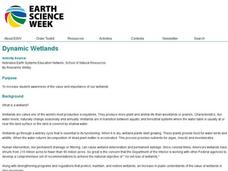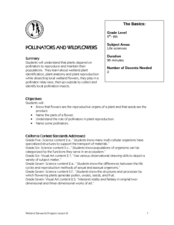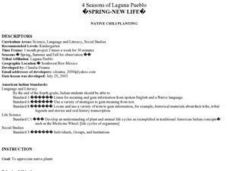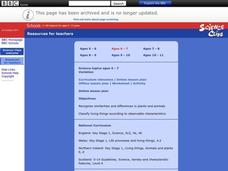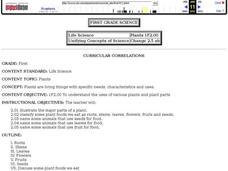Curated OER
Presto Change-o: Caterpillars to Butterflies
Students use the Internet to explore the four stages of a butterfly's life cycle. They make a model of a butterfly using macaroni, sticks and leaves.
Curated OER
Bird Stories: Fact or Fiction
Students evaluate/distinguish scientific fact from fiction. They discuss similarities and differences in the life cycles of various birds. Student use the Internet as a research tool.
Curated OER
Teaching Biology Through Problem-based Activities
Learners plant seeds and observe the life cycle of the organism. They experimentally research the effects of radiation on seed growth. Students determine the effects of environmental pollutants on harvested seed.
Curated OER
Butterfly
Students use a purchased kit to explore the characteristics and life cycles of several butterflies including the Monarch, Western Swallowtail, Red Admiral and Painted Lady. They create a plaster casting of each species for study and...
Curated OER
Water, Water Everywhere (Pond Animals)
Second graders examine the characteristics of animals who live in a pond environment. In groups, they describe the various stages in the life of a frog and identify the characteristics of other pond animals. Using this information,...
Curated OER
Dynamic Wetlands
Students construct and observe a model of two different types of wetlands. For this wetlands lesson, students create a model of a wetland with constant drainage and a wetland that maintains a well-saturated soil. Students observe and...
Curated OER
Teeth and Eating
Students examine pictures of different animals and decide if they eat meat and/or plants. They inspect models of pairs of upper and lower teeth and discuss which teeth are most useful for cutting grass and tearing meat.
Curated OER
Interdependence and Adaptation
Fifth graders construct a food web to illustrate how animals and plants are interdependent. In this interdependence lesson, 5th graders identify how consumers, producers, herbivores, carnivores and predators are related in a habitat....
Curated OER
Pollinators and Wildflowers
Students explore how plants depend on pollinators to reproduce. In this pollination lesson students dissect a local flower and collect and identify pollinating insects.
Curated OER
Sunflower Sundance
First graders study sunflower plants and identify its parts. They plant sunflower seeds and watch them grow and make sunflowers out of paper plates and colored paper. They watch videos and visit websites about sunflowers.
Curated OER
Native Chili Planting
Students discover the process of planting chili. After comparing two types of seeds students plant and with the use of a digital camera, record the seed progress. When ready for transplant, students take young plants to a retirement...
Curated OER
Plant Growth
First graders investigate how seeds are moved and how plants grow. In this plant growth lesson, 1st graders listen to stories, play a game, and view a PowerPoint about plant growth. Students examine various seeds and recognize how...
Curated OER
Variation
Students participate in an online lesson to reinforce the similarities and differences in plants and animals. They classify living things according to observable characteristics.
Curated OER
Hatching Brine shrimp
Second graders investigate the life cycle using brine shrimp as an example. They conduct observations by watching the shrimp hatch out of cysts. Students design simple experiment to structure an observation. The experiment is approved...
Curated OER
Predicting Plant Development
First graders investigate the basic needs of a growing plant and make predictions regarding what a seed needs in order to grow. They draw their seed predictions, listen to the book "From Seed to Plant" by Gail Gibbons, and analyze their...
Curated OER
Patty's Pumpkin Patch
Learners explore Halloween by examining pumpkins in class. In this pumpkin observation lesson, students discuss the method in which pumpkins are grown and the time line it takes a pumpkin to grow from a seed. Learners read a pumpkin poem...
Curated OER
Plants
Learners illustrate the major parts of a plant, classify some plant foods we eat as roots, stems, leaves, flowers, fruits and seeds. They also name some animals that use seeds, leaves, and fruit for food.
Curated OER
Diurnal Cycling Experiments
Learners carry out an experiment to monitor diurnal fluctuations in dissolved oxygen, carbon dioxide, pH, and water temperature. They determine the CO2 and pH of the samples (and optionally, dissolved oxygen). Students complete their...
Education Outside
Seed Saving
After a discussion of the factors that affect seed germination, class groups harvest and preserve seeds from the school garden.
Scholastic
Minibeasts
Lead young scientists to discover insects outdoors. After investigating, students will record observations, learn about these fascinating creatures, craft, and role play.
American Museum of Natural History
What's the Big Deal About Water?
It may seem simple, but water is one of the most unique substances on Earth. An interactive online lesson describes its properties and importance in so many different situations. Learners interact with the lesson to learn the role water...
Core Knowledge Foundation
A Time for All Seasons - Spring
Celebrate the arrival of spring with this fun primary grade science unit. Engaging young scientists with a variety of hands-on activities and inquiry-based investigations, these lessons are a great way to teach children about...
Howard Hughes Medical Institute
Viral Lysis and Budding
How do some viruses spread so quickly, and why do they make us feel terrible? Answer these (and many more) questions through a simple yet impactful lessons. Pupils observe demonstrations that show the two methods viruses use to escape...
Wilderness Classroom
Pollution
Educate scholars on pollution—air, water, and land—with a series of lessons that begin with a thorough explanation of each type. Learners then take part in three activities to reinforce the importance of reducing pollution. They...
Other popular searches
- Flowering Plants Life Cycle
- Seed Plants Life Cycle
- Plants and Animals Life Cycles
- Life Science Plant Life Cycles
- Tomato Plants Life Cycle
- Plants Life Cycles







